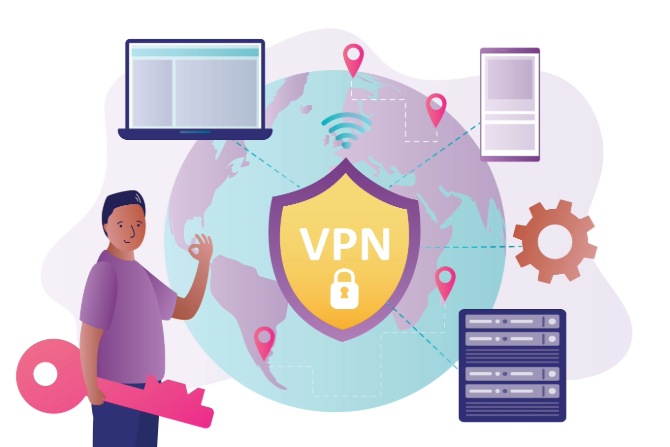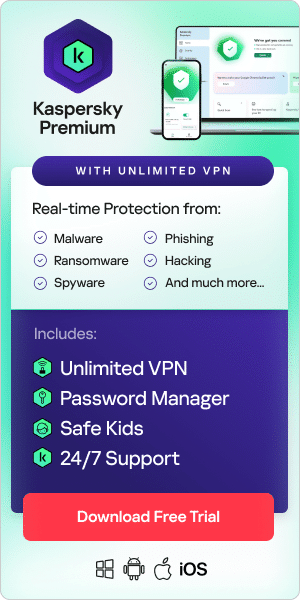
You may notice the decrease in internet or download speed VPN connections can cause. However, there are logical explanations for this – and easy solutions to avoid slow VPN performance.
What is a VPN?
VPN stands for Virtual Private Network. This is a software that acts as a safeguard for your online activity by forming an encrypted tunnel to a remote server.
How does a VPN work?
A VPN hides your IP address and creates a secure tunnel within a unique network that connects your device to a legitimate VPN server.
This connection encrypts all data being processed and reroutes this information via a remote server. The server receives and decrypts your information, processes your request, re-encrypts it, and sends it back to you.
Without a VPN, your connection, and all data – sent and received – is routed via your Internet Service Provider (ISP). This conventional method means that everything you do online is traced back to your IP address and can potentially be intercepted, especially if you’re using an unsecured network.
Why is my VPN so slow?
To fully understand VPN performance or how a VPN slows down your internet, you first need to know some key terms and what goes into the functionality of this software.
IP address
Every internet user has an IP address per device. This is a unique set of characters which tells websites how to find and communicate with your device. Your IP address can tell a lot about you and your online activity, which is why it’s important to keep them confidential – especially when using public Wi-Fi.
Internet Service Provider (ISP)
Mobile data, your home, work internet connection and public Wi-Fi all utilize a router that provides connectivity to the internet. Different countries each have their own companies and providers.
Cyber threat
Digital infiltration of networks with malicious intent, such as acquiring data, gaining unauthorized access to sensitive data, stealing information for exploitation, etc. To fully understand the magnitude of cyber threats, the Kaspersky live tracking map highlights these detections.
VPN server
A server is a system that processes, receives, and sends data over a network.
A VPN server hosts the software necessary to provide the company’s VPN clients with the secure connection that they are paying for.
VPN protocols
VPN protocol is a system on its own. A VPN uses a set of rules (protocols) that determine how your data moves through the secure connection regarding speed, security, and reliability. There are several VPN protocol providers, each of which uses a unique code to function.
Encryption
Encryption is a process where data is converted into code to make it incomprehensible to anyone who might intercept it.
How does VPN affect internet speed?
Many customers will ask ‘does a VPN interfere with Wi-Fi’ or, on the other end of the spectrum, does a VPN make your internet faster? – the short answer to both of these is ‘no’, but let’s look into the question a little more.
Depending on your service provider, device and other aspects in your setup, a VPN can effectively slow your internet speed down by up to 50%.
Your VPN is just software that encrypts and reroutes your traffic, using your ISP connection on your network. Its primary function is to keep data safe, and it does not affect the WiFi itself. While a lot of research and work goes into developing this software to ensure it runs at an optimal speed, there are several areas that can impact your internet speed.
Type of device used
As a software, VPNs have their own processing requirements. If you’re using an old or outdated device, it may not have the necessary performance capabilities required to handle the additional processing load.
Type of connection
While Wi-Fi is always more convenient, your internet connection may be too weak or not fast enough to handle the amount of additional processing required. In addition, if it’s a shared network, this also plays a large role in reducing internet speed.
Distance to server
If you’re using a server that is on a different continent or too far away from your physical location, this increases the latency as the information needs to be encrypted and decrypted, over a long distance.
Encryption and protocols
As a VPN encrypts every piece of data sent and received, this requires additional processing from the server and your system. Different protocols prioritize different functions to balance speed, security, and reliability, which can contribute to a slow VPN.
Server overload
If your VPN server is nearing or reached its capacity of users, this can impact the speed for everyone connected.
Can you improve your VPN’s performance?
Slow internet speed can lead to unproductivity or simple frustrations. Understandably, people forgo VPNs to ensure that they maintain a fast connection.
There are a number of solutions you can apply to ensure that you do not lose speed – many of which are either a quick fix, and stem from utilizing your VPN incorrectly.
Change providers
Your ISP provider may be throttling your bandwidth or may simply not be strong enough to handle your online activities. Look into upgrading your current package or changing ISP providers altogether.
Switch to an Ethernet cable
It’s important to note that a VPN does slow down gaming. However, by switching your connection from Wi-Fi to an Ethernet cable, you’ll find that your internet speed can increase as the connection is direct and more secure.
Choose a reputable VPN
Premium software utilizes legitimate servers and protocols for fast and secure online privacy. While there are many free options out there, there’s a good chance that they won’t be as fast or secure as a premium option.
Change your VPN Protocols
Your VPN provider allows access to the various VPN protocols in place. Do your research into the specific protocols your service uses and change them accordingly to suit your needs.
Use a closer server
Change your VPN server to one that is closer to your physical location or choose a split-tunneling option that allows you to allocate your VPN to specific browsers or search engines.
Update software
All software is constantly improved to not only perform better but also to circumnavigate potential threats. As standard best practice for any device usage, ensure that all your software is up to date from legitimate sources.
What are the benefits of using a VPN?
Protection
Your VPN encryption ensures that sensitive data, such as banking details, is kept private and untraceable, meaning it can’t be intercepted by hackers. Some VPN features include automatic activation when threats are detected.
Accessibility
Some online content is not available everywhere. By connecting to an international VPN server, you’ll bypass geo-restrictions and access websites or content that is not available in your region.
Anonymity
As your VPN hides your IP address, you’re reducing your chances of being tracked for advertisements or by individuals and software with malicious intent while browsing online.
Bypass throttling
Some ISP may be throttling your bandwidth without you even realizing. Throttling is when your ISP slows down your internet speed on purpose. There are a number of reasons this happens, including visiting the same sites frequently or reaching your data limit. With a VPN, all of your data and online activity is encrypted and therefore invisible to your ISP.
Reduced support costs
Without a VPN, you can continue to browse the web as you please. However, should you run into malware or your current security gets hacked, it’s an incredibly costly process to fix or replace your entire system. Most importantly, VPNs protect your identity online, which can have devastating consequences if these details fall into the wrong hands.
VPN products
Kaspersky VPN Secure Connection
For businesses and home networks, securing your information is a worthy investment to implement, and Kaspersky VPN offers solutions for both.
According to AV-TEST GmbH, this is one of the fastest and safest VPN products available today.
Privacy features
- Secures your IP address.
- Additional security to prevent data leaks.
- Automatic features that cut connectivity at potential threats.
- Applicable on all devices connected to your home Wi-Fi.
Servers
- Choose from over 2000 high-speed servers to access global content on leading streaming services.
- Enjoy fast connection from servers of up to 10Gbps, which ensures devices maintain their speed.
Customization
- Split tunnel options to route specific apps through the VPN automatically
- Set certain apps to run with VPN, such as browsers or banking apps.
Fast protocols
Kaspersky utilizes the best-performing, advanced protocols to ensure security and speed. These are:
- Hydra - for Windows.
- WireGuard - for Windows and macOS.
- OpenVPN.
Kaspersky VPN Secure Connection is compatible with a wide range of devices, including mobile and smart home systems, to enhance online activities, such as:
- Gaming - lag-free, low ping while maintaining excellent performance.
- Streaming - all of your favorite shows from across the globe in 4K.
- Torrent - fast, safe, and secure way to download files anonymously.
- Shopping - global shopping with secure pay gateways.
- Crypto - access your favorite exchanges while trading securely.
- Coding - use VPN servers to access a wide variety of tools.
Kaspersky is an award-winning software that is regularly assessed by independent experts.
Related Articles:
Related Products:

